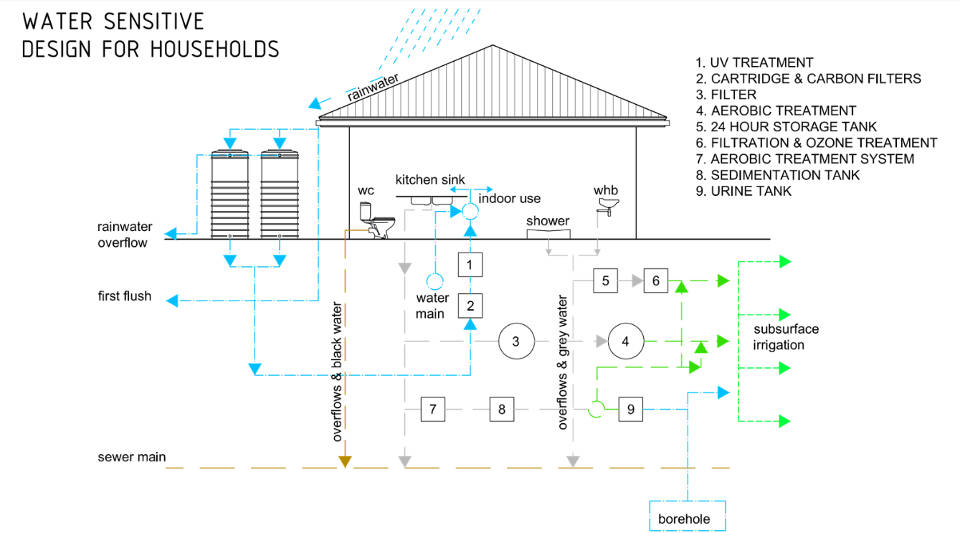Grey water is wastewater generated from domestic processes such as dish washing, laundry and bathing. It gets its name from its cloudy appearance and from its status as being neither fresh (white water from groundwater or potable water), nor heavily polluted (black water, which contains faeces or toxic chemicals). Grey water makes up 50-80% of residential wastewater, and can be easily recycled for domestic and irrigation use. This kind of water recycling saves money and also helps to limit water wastage and over-use in South Africa. Check out the various products that can assist you in recycling grey water in your home and garden.
To use the Grey Water System:
The safest method of utilising grey water is to irrigate in a manner that avoids human or animal contact during the irrigation process. This is easily achieved as households generally bath or shower in the early morning and/or evening and it is during these hours that evaporation and activity is reduced.
Most household grey water contains compounds that may be useful to your garden. Compounds in grey water include nitrate and phosphates which are, in most cases, beneficial to plants in small doses. These are compounds that are also found in most garden fertilizers. There are however a few exceptions.
Important Information:
Plants that are found naturally in the wild are intolerant of phosphate and therefore care must be taken to avoid over-watering with grey water.
Grey water is generally alkaline and this must be considered when watering acid loving plants. Edible plants or herbs should not be watered with grey water within two weeks of harvesting and should be washed carefully before consumption.
If required, your garden centre or nursery will be able to assist and provide further information on the use of grey water on your plants.
Please use drain cleaners, harsh chemicals, bleaches and household detergents sparingly in order to limit the negative effect on the garden. (In the event that excessive amounts of chemicals are used, it is recommended that one temporarily diverts the waste water to the main sewage system).
As regular soaps and detergents contain high levels of sodium, it is recommended that the use of biodegradable and soap-free cleaners be used wherever possible.
Operation:
The automated pump mechanism of the unit is specifically designed for use with a low pressure pyramid type sprinkler attachment. This unit is not designed to operate a ‘pop up’ or any other high pressure sprinkler system.
Landscaping conditions may require that the length of irrigation pipe or garden hose be lengthened or shortened. Extensive testing on a level landscaped garden has shown that a single low pressure sprinkler is accommodated very well on a 20 metre irrigation pipe (20mm). This is sufficient for most small to medium sized gardens. The unit can efficiently distribute water to a height of 0.5 metres above the unit.
Output:
This unit can process approximately 12 litres of grey water per minute (+/-60 litres per five minute shower) with a 20 meter irrigation pipe (20mm) on level ground.
Maintenance:
Failure to keep your Grey Water System filter clean and free from debris will result in grey water returning to the sewer via the failsafe return to sewer facility.
Damage could be caused to the pump should the filter basket not be in place. A dirty filter will also prevent the unit from working at its optimum.
Easy access to the filter basket has been provided by means of a removable lid located on the top of the unit. Clean the filter basket of any hair and debris and reposition the basket in the unit. It is essential to ensure that the filter basket is well seated when replaced.
There are no serviceable parts in the sealed Grey Water unit. In order to prevent an electrical shock, do not attempt to open the unit. If the unit is tampered with. the warranty will not be honoured.
Rainwater Harvesting Alternative
Rainwater harvesting means capturing the rain where it falls or capturing the runoff and taking measures to store that water and keep it clean.
Domestic rainwater harvesting system consists of:
- a collection surface,
- a storage tank, and
- guttering or channels to transport the water from one to the other.
Peripheral equipment sometimes incorporated:
- a first-flush system,
- a filtration equipment, and
- settling chambers
We will design a system that will suit your needs and property layout. Give us a call to assess your requirements


Grey Water

Ensuring Efficiency
